Introduction
Project Management Professional (PMP) is one of the globally recognized management certification courses which validates your ability to take up jobs as a project manager all over the world. The certificate is given by the Project Management Institute (PMI) for all those who want to work as project managers. The certificate is recognized globally as a standard to measure the skills of project managers. Mentioned below is everything you need to know about PMP like, who should take PMP certification and why, cost of the certification, etc.
Overview
Who Should Take PMP Certification?
Every field desires to hire the best project managers to ensure the smooth functioning of their project, along with the best results. When these companies hire project managers, they look for people who can take responsibility and lead others effectively. PMP certification course will not only instil all these skills in you but also increase your chances of employability. Furthermore, with a PMP certification, you’ll be better equipped to understand the purpose of the project and ensure alignment with overall business goals.
While this course is not mandatory, if you want to strengthen your credibility and boost your resume, then it is highly recommended to get a PMP professional certificate. However, there are some criteria you would be expected to meet before you can apply for the certification.
Learn How to Implement the Zero Defect Concept
Requirements for PMP Certification
Mentioned below are some mandatory requirements for the PMP certification course.
• Minimum 7,500 hours of project management experience and +35 hours of relevant education
• Or, a relevant four-year degree program combined with minimum 4,500 hours project leading experience and a minimum of 35 hours of management training.
Read More: User Stories vs Use Cases-Common Points
How to apply?
• Confirm if you are eligible to take the exam
• Create an account at the PMI website
• Fill in your personal details and information like projects you have led, internships completed, etc.
• Pay the application fee
Also Read: Learn More About Change Control Process
Cost of the exam
The examination differs for members and nonmembers:
| Cost | |
| Members | US$425 |
| Nonmembers | US$575 |
How to schedule the exam?
Once you have completed your application and are deemed eligible, PMI will email you the exact time for your exam appointment along with the instructions and eligibility code.
Format for PMP Exam
The exam for PMP certification has 180 questions. These questions are spread across three domains outlined by PMI. Each domain highlights different facets of project management, with questions rooted in the tasks and necessary knowledge & skills for each domain.
Here is the breakdown –
| Domain | Domain Weightage | Approx. no. of Questions | Focus Area |
| People | 42% | ~60 | Conflict resolution, Stakeholder engagement, team performance |
| Process | 50% | ~60 | Methodology application, Project lifecycle, Resource management, Quality Assurance |
| Business Environment | 8% | ~60 | Organizational governance, business alignment, Compliance |
Important Note: The percentages provided do not represent the weightage of questions in the exam. Instead, they indicate the focus given to each section during the training and its significance in achieving a passing score.
How to prepare for the exam?
It is advisable to prepare for the exam using the PMBOK guide. It is a set of standard terminology and guidelines which are used for project management globally. The applicant should cover topics like,
• Processes for managing stakeholders
• EVM graphs and metrics
• Financial forecasting
• Organizational behaviour
• Management science
Following a structured PMP Preparation Guide helps ensure you cover all required exam domains thoroughly.
In addition, practicing PMP Exam Questions can also be very helpful in familiarizing yourself with the exam format and types of questions you can expect. If you want a proper guidence with a scuessful roadmap to pass PMP exam, you can enroll to PMP Exam Prep.
How to retake the exam?
If the applicant fails the exam in the first attempt, then he/she can take the exams two more times in the one year eligibility period. The applicant will be required to pay the application fee again.
How long is PMP certification valid?
After passing the exam, the Project Management Professional Certification is not valid for a lifetime. It is only valid for three years. However, PMI allows you to recertify through their CCR program, i.e. continuing certification requirements. Under the program, you will be expected to undergo training that will enhance your skills as a project manager. and also learn about the plan of work.
If you are still wondering who should take a PMP certification then you should know, in whatever field you work, you will be expected to perform your best. PMP certification will allow you to improve your skills in the field you are best suited in along with the opportunity to increase your employability chances.What Do you think Is PMP Certification Worth it?















